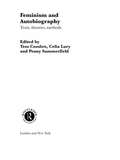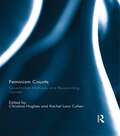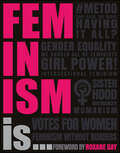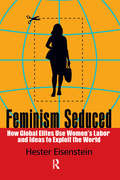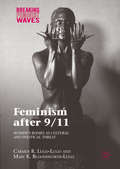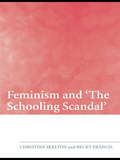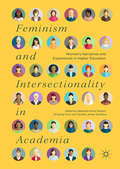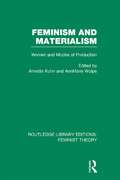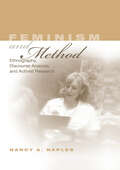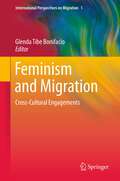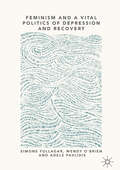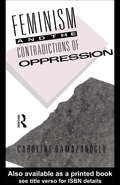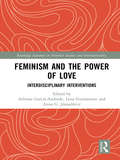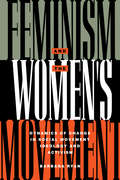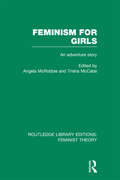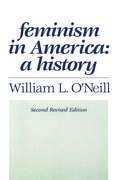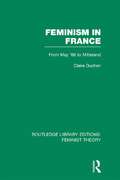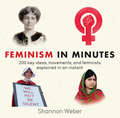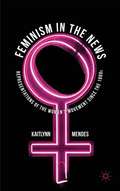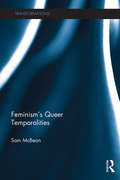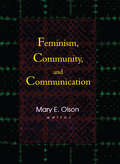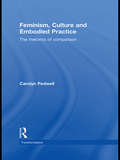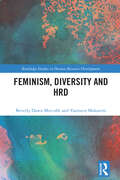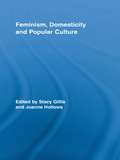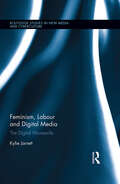- Table View
- List View
Feminism & Autobiography: Texts, Theories, Methods (Transformations)
by Celia Lury Penny Summerfield Tess CoslettFeaturing essays by leading feminist scholars from a variety of disciplines, this key text explores the latest developments in autobiographical studies. The collection is structured around the inter-linked concepts of genre, inter-subjectivity and memory. Whilst exemplifying the very different levels of autobiographical activity going on in feminist studies, the contributions chart a movement from autobiography as genre to autobiography as cultural practice, and from the analysis of autobiographical texts to a preoccupation with autobiography as method.
Feminism Counts: Quantitative Methods and Researching Gender
by Rachel Lara Cohen Christina HughesThis is an important and timely text that provides a unique overview of contemporary quantitative approaches to gender research. The contributors are internationally recognised researchers from the UK, USA and Sweden who occupy a range of disciplinary locations, including historical demography, sociology and policy studies. Their research includes explorations of heterosexual and same sex violence, media responses to feminist research, data sources for the study of equalities, approaches for analysing global and local demographic change and intersectional concerns in respect of work and employment.Through detailed, sophisticated and thoughtful considerations of the place of quantification within gender studies, and the place of feminist approaches to quantification, each contributor overturns the stereotype that quantitative research is antithetical to feminism by demonstrating its importance for challenging continuing global inequalities associated with gendered outcomes. An introductory chapter illustrates the significance of geography and discipline in the take-up of methodological preferences.Feminism Counts: Quantitative Methods and Researching Gender makes an important contribution to the ways in which feminists respond to contemporary methodological and interdisciplinary challenges, and is essential reading for all research students in gender studies.This book was originally published as a special issue of the International Journal of Social Research Methodology.
Feminism Is... (DK Heads UP)
by DK"This book is something I wish I could have read when I was younger." --Roxane Gay, from the foreword of Feminism Is...It didn't just start with #MeToo. Today's feminism is more diverse than ever before and asks all kinds of questions. Combining insightful text with graphic illustrations, Feminism Is...tackles topics including intersectionality, the gender pay gap, the male gaze, and mansplaining. Find out what equality for women really means, get a short history of feminism, and take a look at the concerns affecting women at work, in the home, and around sex and identity. Get answers to the big issues and meet some of the most groundbreaking feminists like Audre Lorde and bell hooks. Addressing ongoing feminist concerns and including an original foreword by Roxane Gay, Feminism Is... takes on important themes in informative, thought-provoking ways.
Feminism Seduced: How Global Elites Use Women's Labor and Ideas to Exploit the World
by Hester EisensteinIn a pioneering reinterpretation of the role of mainstream feminism, Eisenstein shows how the ruling elites of developed countries utilize women's labor and the ideas of women's liberation and empowerment to maintain their economic and political power, both at home and abroad. Her explorations range from the abolition of "welfare as we know it" and the ending of the family wage in the United States to the creation of export-processing zones in the global South that depend on women's "nimble fingers"; and from the championing of microcredit as a path to women's empowerment in the global South to the claim of women's presumed liberation in the West as an ideological weapon in the war on terrorism. Eisenstein challenges activists and intellectuals to recognize that international feminism is at a fateful crossroads, and argues that it is crucial for feminists to throw in their lot with the progressive forces that are seeking alternatives to globalized corporate capitalism.
Feminism after 9/11
by Carmen R. Lugo-Lugo Mary K. Bloodsworth-LugoThis book is about social phenomena that directly acknowledge the structures and ideologies emerging after September 11, 2001. It considers how these structures and ideologies manage, control, and contain specific bodies with respect to race/ethnicity, gender, sexuality, and citizenship status. Inflections presented via "9/11" come into play against a backdrop shaped by established patterns of behavior and attitudes toward women and particular groups of people within an American landscape. As a result, existing notions of threat combine with 9/11 inflections to shape a specific conception of threat in a context "after" 9/11, and within this context, a feminism "after" 9/11 emerges. This contextualized feminism would have to develop its analysis within the frame of a society fundamentally altered by the events of 9/11, including its ideological aftermath, by foregrounding pertinent social categories as they interplay with women's bodies.
Feminism and 'The Schooling Scandal'
by Christine Skelton Becky FrancisFeminism and ‘The Schooling Scandal’ brings together feminist contributions from two generations of educational researchers, evaluating and celebrating the field of gender and education. The focus throughout is on the years of compulsory schooling, examining key concepts in gender and education identified and developed by international thinkers in educational feminism. Topics covered include: social class, ethnicity and sexuality in relation to experiences in school; theories and methodologies for understanding gender; pedagogy and practice in education; and the direction of educational policy and the ‘problem of boys’. Providing a comprehensive overview of contemporary research and theory emerging from ‘second wave’ feminism and assessing their impact on pupils and teachers in today’s schools and classrooms, this book forms essential reading for anyone studying gender and education.
Feminism and Intersectionality in Academia: Women’s Narratives and Experiences in Higher Education
by Stephanie Anne Shelton Jill Ewing Flynn Tanetha Jamay GroslandThis edited volume explores the diversities and complexities of women’s experiences in higher education. Its emphasis on personal narratives provides a forum for topics not typically found in in print, such as mental illness, marital difficulties, and gender identity. The intersectional narratives afford typically disenfranchised women opportunities to share experiences in ways that de-center standard academic writing, while simultaneously making these stories accessible to a range of readers, both inside and outside higher education.
Feminism and Materialism: Women and Modes of Production (Routledge Library Editions: Feminist Theory)
by Annette Kuhn AnnMarie WolpeThese original essays are planned to provide a coherent basis for an understanding of women’s social and historical situation. This achieved by outlining the foundation of a systematic approach to an analysis of women’s relationship to modes of production and reproduction within a materialist framework. The essays, each with a brief editorial introduction, deal with issues and perspectives brought increasingly to the fore in recent years, not only in the women’s movement but in the social sciences generally. The articles are wide-ranging, covering such issues as patriarchy, paid and unpaid labour and the state. The centrality of two of the major themes – the family and the labour process – suggests that an understanding of women’s situation is necessarily based on an analysis of the structures of production and reproduction. The authors’ aim in producing Feminism and Materialism is to confront systematically theoretical issues current in the developing area of women’s studies, while recognising that this must constitute a critique of existing theoretical frameworks. The book will be of interest to teachers and students in the social sciences and in women’s studies, as well as to all those who wish to develop an understanding of what a materialist approach to feminism might be.
Feminism and Method: Ethnography, Discourse Analysis, and Activist Research
by Nancy A. NaplesNaples draws on different research topics, such as welfare, poverty, sexual identity, and sexual abuse, to illustrate some of the most salient dilemmas of feminist research: the debate over objectivity, the paradox of discourse, the dilemma of "standpoint," and the challenges of activist research. By linking important feminist theoretical debates with case studies, Naples illustrates the strategies she developed for resolving the challenges posed be postmodern, Third World, postcolonial, and queer studies.
Feminism and Migration
by Glenda Tibe BonifacioFeminism and Migration: Cross-Cultural Engagements is a rich, original, and diverse collection on the intersections of feminism and migration in western and non-western contexts. This book explores the question: does migration empower women? Through wide-ranging topics on theorizing feminism in migration, contesting identities and agency, resistance and social justice, and religion for change, well-known and emerging scholars provide in-depth analysis of how social, cultural, political, and economic forces shape new modalities and perspectives among women upon migration. It highlights the centrality of the various meanings and interpretations of feminism(s) in the lives of immigrant and migrant women in Australia, Belgium, Brazil, Eastern Europe, France, Greece, Japan, Italy, Mexico, Morocco, Papua New Guinea, Spain, and the United States. The well-researched chapters explore the ways in which feminism and migration across cultures relate to women's experiences in host societies --- as women, wives, mothers, exiles, nuns, and workers---and the avenues of interactions for change. Cross-cultural engagements point to the convergence and even disjunctures between (im)migrant and non-immigrant women that remain unrecognized in contemporary mainstream discourses on migration and feminism.
Feminism and a Vital Politics of Depression and Recovery
by Simone Fullagar Adele Pavlidis Wendy O’BrienDrawing upon insights from feminist new materialism the book traces the complex material-discursive processes through which women’s recovery from depression is enacted within a gendered biopolitics. Within the biomedical assemblage that connects mental health policy, service provision, research and everyday life, the gendered context of recovery remains little understood despite the recurrence and pervasiveness of depression. Rather than reducing experience to discrete biological, psychological or sociological categories, feminist thinking moves with the biopsychosocialities implicated in both distress and lively modes of becoming well. Using a post-qualitative approach, the book creatively re-presents how women ‘do’ recovery within and beyond the normalising imperatives of biomedical and psychotherapeutic practices. By pursuing the affective movement of self through depression this inquiry goes beyond individualised models to explore the enactment of multiple self-world relations. Reconfiguring depression and recovery as bodymind matters opens up a relational ontology concerned with the entanglement of gender inequities and mental (ill) health.
Feminism and the Contradictions of Oppression
by Caroline RamazanogluFeminism and the Contradictions of Oppression is a penetrating and comprehensive study of the development of feminism over the last thirty years. The first part of this major new textbook examines feminist theory and feminist political strategy. The second section examines how contradictions of class, race, subculture and sexuality divide women. The final part explores ways out of the impasse. This level-headed and challenging book is one of the most notable contributions to feminism in recent years.
Feminism and the Power of Love: Interdisciplinary Interventions (Routledge Advances in Feminist Studies and Intersectionality)
by Adriana García-Andrade Lena Gunnarsson Anna G. JónasdóttirThe power of love has become a renewed matter of feminist and non-feminist attention in the 21st century’s theory debates. What is this power? Is it a form of domination? Or is it a liberating force in our contemporary societies? Within Feminism and the Power of Love lies the central argument that, although love is a crucial site of gendered power asymmetries, it is also a vital source of human empowerment that we cannot live without. Instead of emphasizing "either-or", this enlightening title puts the dualities and contradictions of love center stage. Indeed, by offering various theoretical perspectives on what makes love such a central value and motivator for people, this title will increase one’s understanding as to why love can keep people in its grip - even when practiced in ways that deplete and oppress. In light of such analyses, the contributions within Feminism and the Power of Love present new perspectives on the conditions and characteristics of non-oppressive, mutually enhancing ways of loving. Bridging the gap between Feminist Affect Studies and Feminist Love Studies, this book will appeal to undergraduate and postgraduate students, including postdoctoral researchers, interested in fields such as women’s and gender studies, sociology, political science, philosophy, cultural studies and sexuality studies.
Feminism and the Women's Movement: Dynamics of Change in Social Movement Ideology and Activism (Perspectives on Gender)
by Barbara RyanIn Feminism and the Women's Movement, Barbara Ryan integrates a broad historical view with an analytical framework drawn from the theory of social movements. Relying on participation and observation of diverse groups involved in the woman's movement, interviews with long-term activists, and readings of historical and contemporary movement publications, she discusses the changing nature of feminist ideology and movement organizing. Ryan portrays the successes and difficulties that women have faced in their efforts to effect social change in recent history.
Feminism for Girls: An Adventure Story (Routledge Library Editions: Feminist Theory)
by Angela Mcrobbie Trisha MccabeFeminism for Girls presents feminist perspectives on aspects of adolescence which have been chosen for their special relevance to the lives and experiences of girls and young women today. Illustrated throughout, chapters cover themes and topics which include romance and sexuality, girls’ magazines, careers and the reality of being a black girl in society today. Housewives look back at their youth and a sixteen-year-old girl writes vividly about what it’s like trying to break out of the mould that parents and others so often expect for girls. This book is written for girls and young women themselves and for people who are, like the contributors, currently teaching or working with girls.
Feminism in America: A History
by William L. O'NeillWilliam L. O'Neill's lively history of American women's struggle for equality is written with style and a keen sense for the variety of possible interpretations of 150 years of the feminist movement, from its earliest stirring in the 1830's to the latest developments in the 1980s.O'Neill's most controversial thesis is that the feminist movements of the past have largely failed, and for reasons that remains of deep concern; the movements have never come to grips with the fact that marriage and the family are the chief obstacles to women's emancipation. O'Neill also holds that the sexual revolution of the 1920s, far from liberating women, actually undermined their role in American life.O'Neill treats seriously the ideas of the great feminist leaders and their organizations. His was the first book to deal directly with the failure of feminism as a social force in American society; to tie together the scattered people and events in the history of American women; and to examine seriously feminist experience in the twentieth century. Since the women's agenda is hardly complete, the women's movement remains active, often militantly so. In this new revised edition, O'Neill interprets and illumines not only the history of feminism, but aspects of feminism that still trouble us today.O'Neill's book was widely heralded upon its initial publication. Elizabeth Janeway, writing for Saturday Review, calls it "a truly intelligent discussion...an extraordinary perceptive analysis." Carl Degler, in the Magazine of History calls A History of American Feminism "the most challenging and exciting book on the subject of women to appear in years." And Lionel Tiger, writing for the NewRepublic, says that "O'Neill has turned his mastery of a wide range of historical sources into a lively, engaging, and almost faultlessly sensible book."
Feminism in France: From May '68 to Mitterand (Routledge Library Editions: Feminist Theory)
by Claire DuchenFeminism in France charts the evolution of the women’s liberation in France (MLF) from its emergence in 1968 to the present. Claire Duchen provides a lucid and compelling account of different feminist practices in France, clarifying the divergent political stances and the feminist theory that informs them. The remarkably clear introduction to French feminist theory, notably of Luce Irigaray and Helene Cixous, places it in its wider intellectual and political context and illuminates the complex connection of feminist thinking to other strands of contemporary French thought, represented by philosophers such as Michel Foucault and Jacques Lacan. The author’s role as ‘participant observer’ and her inclusion of interviews with French activists enhance her discussion, complementing the analytical with the immediacy of lived experience. ‘Claire Duchen’s lucid and succinct account is both timely and valuable.’ – Harriet Gilbert, New Statesman ‘Lucid, sympathetic and very helpful book on the French women’s movement ... will help us to understand the French feminist world much better.’ – Sian Reynolds, Women’s Review ‘An excellent introduction to French feminist theory which clarifies feminism in contemporary French thought, and includes illuminating interviews with activists.’ - SHE
Feminism in Minutes (In Minutes)
by Shannon WeberWHAT DOES FEMINISM REALLY ENTAIL?200 KEY IDEAS, MOVEMENTS, AND FEMINISTS, EXPLAINED IN AN INSTANTHaving an understanding of feminism is more important now than ever. But what really is feminism--in all its forms? Who were the key feminists, and what are their beliefs? What do feminists think about abortion, sex, religion, pornography, and beauty? And have women achieved equality--or is there still much to do?Feminism in Minutes is the quickest, easiest way to understand the big ideas and history of feminism, from its ancient roots to the #MeToo movement today.Contents include: Basic Concepts; Schools of Feminism; Marriage and Motherhood; Sex, Power, and Sexuality; Activism and Justice; Gender, Religion, War; Women's Achievements in Science and Medicine; Feminism in the Arts; as well as the ideas of essential feminists such as Simone de Beauvoir, Emmeline Pankhurst, Sojourner Truth, Germaine Greer, Betty Friedan, Gloria Steinem, Pussy Riot, and Malala Yousafzai, among many others.
Feminism in the News
by Kaitlynn MendesAn exploration of therepresentations of the women's movement, its members, and their goals between 1968 and 2008 in the British and American press. Examining over 1100 news articles, the book analyses the nuanced ways feminism has historically been supported, marginalized and debated in the mainstream press. "
Feminism's Queer Temporalities (Transformations)
by Sam McBeanDespite feminism’s uneven movements, it has been predominantly understood through metaphors of generations or waves. Feminism's Queer Temporalities builds on critiques of the limitations of this linear model to explore alternative ways of imagining feminism’s timing. It finds in feminism’s literary and cultural archive narratives of temporality that might now be diagnosed as queer, where queer designates modes of being historical that exceed the linear and the generational. Few theorists have looked to popular feminist figures, literature, and culture to theorize feminism’s timing. Through methodologically creative readings, McBean explores non-generational, anti-linear, and asynchronous time in the figure of Antigone, Marge Piercy’s Woman on the Edge of Time, the film Ladies and Gentlemen: The Fabulous Stains, Valerie Solanas and SCUM Manifesto, and Alison Bechdel’s Fun Home. The first to substantially bring together the ways in which time has come to matter in both feminist and queer disciplines, this book will appeal to students and scholars of feminist, queer and gender studies, cultural studies and literary studies.
Feminism, Community, and Communication
by Betty Mackune-Karrer Mary E Olson. . . from the minds of therapists on the cutting edge!This informative, innovative collection brings together the work of a group of “scholar-therapists,” all women, who have met regularly for ten years to discuss family therapy, gender, and postmodern ideas. The major themes--feminism, community, and communication--are taken in new directions. Feminism, Community, and Communication rethinks therapy, research, teaching, and community work with a renewed emphasis on collaboration, intersubjectivity, and the process of communication as a world-making and identity-making activity. The issues of gender, culture, religion, race, and class figure prominently in this book.In Feminism, Community, and Communication you'll find descriptions of: communal perspectives for therapists that stress listening and understanding over interpreting and knowing the power of love and spirituality in relation to organizational consultation to an agency beset by racial division research on anorexia and what it means a mentoring project for rural girls the Bar/Bat Mitzva as therapy an ethnographic study of Lebanese womenFeminism, Community, and Communication takes an exciting, fresh look at these three intertwined concepts, representing a way of thinking and doing therapy, research, community work, and training that highlights the ethical dimension of each. The book takes the position that human beings are meaning-makers in a common world, and not simply objects to be scrutinized or assessed by “experts.”
Feminism, Culture and Embodied Practice: The Rhetorics of Comparison (Transformations)
by Carolyn PedwellWithin both feminist theory and popular culture, establishing similarities between embodied practices rooted in different cultural and geo-political contexts (e.g. ‘African’ female genital cutting and ‘Western’ cosmetic surgery) has become increasingly common as a means of countering cultural essentialism, ethnocentrism and racism. Feminism, Culture and Embodied Practice examines how cross cultural comparisons of embodied practices function as a rhetorical device – with particular theoretical, social and political effects - in a range of contemporary feminist texts. It asks: Why and how are cross-cultural links among these practices drawn by feminist theorists and commentators, and what do these analogies do? What knowledges, hierarchies and figurations do these comparisons produce, disrupt and/or reify in feminist theory, and how do such effects resonate within popular culture? Taking a relational web approach that focuses on unravelling the binary threads that link specific embodied practices within a wider representational community, this book highlights how we depend on and affect one another across cultural and geo-political contexts. This book is valuable reading for undergraduates, postgraduates, and researchers in Gender Studies, Postcolonial or Race Studies, Cultural and Media Studies, and other related disciplines.
Feminism, Diversity and HRD (Routledge Studies in Human Resource Development)
by Beverly Dawn Metcalfe Yasmeen MakaremFeminism, Diversity and HRD aims to enhance critical understandings of feminism, diversity and HRD theorization and practice in the global political economy. This involves addressing race, class and intersectional approaches to evaluating inequalities in society/organizations.The book will bring together cutting-edge analysis to offer a critical interdisciplinary overview of the feminism, diversity and HRD debates that are only just emerging. Crucially, it will offer new insights on the governance and policy-making dimensions of national HRD, and the gender agendas advocated by global institutions which are influenced by social justice themes.In this respect, the contributions in this volume offer more than just a tried and tested analysis of the political, knowledge and skill gap problems that face organizations and nation states. Rather, they are agenda-setting and forward-looking since they critically consider what the HRD solutions currently on offer are, and how they can be further improved. Thus, the contributions will cover theoretical and policy perspectives not previously covered in a critical text of this kind.
Feminism, Domesticity and Popular Culture (Routledge Advances in Sociology)
by Joanne Hollows Stacy GillisThe relationship between feminism and domesticity has recently come in for renewed interest in popular culture. This collection makes an intervention into the debates surrounding feminism’s contentious relationship with domesticity and domestic femininities in popular culture. It offers an understanding of the place of domesticity in contemporary popular culture whilst considering how these domesticities might be understood from a feminist perspective. All the essays contribute to a more complex understanding of the relationships between feminism, femininity and domesticity, developing new ways of theorizing these relationships that have marked much of feminist history. Essay topics include Marguerite Patten, reality television shows like How Clean is Your House?, the figure of the maid in contemporary American cinema, aging or widowed domestic femininities, and the relationship between domesticity and motherhood.
Feminism, Labour and Digital Media: The Digital Housewife (Routledge Studies in New Media and Cyberculture)
by Kylie JarrettThere is a contradiction at the heart of digital media. We use commercial platforms to express our identity, to build community and to engage politically. At the same time, our status updates, tweets, videos, photographs and music files are free content for these sites. We are also generating an almost endless supply of user data that can be mined, re-purposed and sold to advertisers. As users of the commercial web, we are socially and creatively engaged, but also labourers, exploited by the companies that provide our communication platforms. How do we reconcile these contradictions? Feminism, Labour and Digital Media argues for using the work of Marxist feminist theorists about the role of domestic work in capitalism to explore these competing dynamics of consumer labour. It uses the concept of the Digital Housewife to outline the relationship between the work we do online and the unpaid sphere of social reproduction. It demonstrates how feminist perspectives expand our critique of consumer labour in digital media. In doing so, the Digital Housewife returns feminist inquiry from the margins and places it at the heart of critical digital media analysis.
